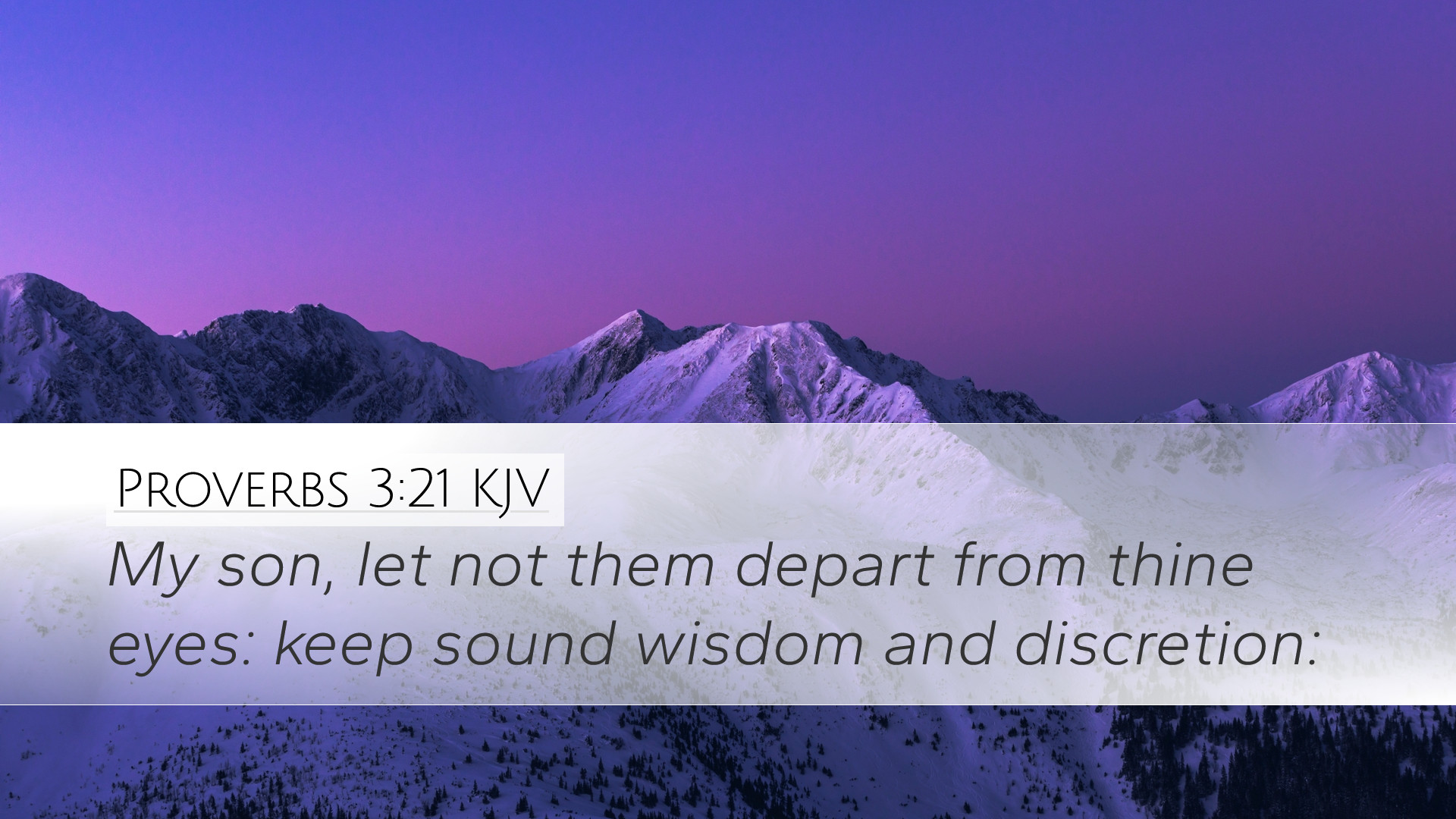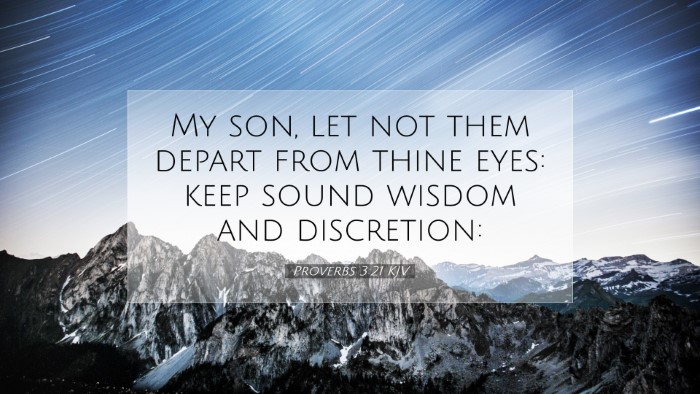Commentary on Proverbs 3:21
Verse: "My son, let not them depart from thine eyes: keep sound wisdom and discretion."
Introduction
This verse from the book of Proverbs encapsulates the significance of wisdom and discretion in the life of a believer. It emphasizes the need to not only acquire wisdom but to carefully guard and retain it in our everyday thoughts and actions. The wisdom referred to here is likely both practical knowledge and deep spiritual insight, guiding one's decisions and interactions.
Insights from Public Domain Commentaries
Matthew Henry's Commentary
Matthew Henry expresses that this verse is a paternal exhortation, encouraging the reader to keep wisdom and discretion consistently in view. He notes that:
- The importance of wisdom: Wisdom is described as something precious and valuable, akin to a treasure that should not be regarded lightly.
- The role of discretion: Discretion acts as a complementary quality to wisdom, enabling one to not only make good decisions but also to assess situations judiciously.
- Observance and remembrance: By advising against allowing wisdom and discretion to depart from our eyes, Henry highlights the necessity of continual contemplation and mindfulness regarding these virtues.
Henry also elaborates that maintaining an awareness of sound wisdom is crucial for spiritual health, which is rooted in God’s truth and faithful living. This vigilance will guard the heart and influence one's actions.
Albert Barnes' Notes on the Bible
Albert Barnes emphasizes the practical aspects of this exhortation. He notes that:
- Sound wisdom: This refers specifically to wisdom that is practical and useful, as well as morally sound which helps individuals navigate through the complexities of life.
- Keeping wisdom and discretion: He suggests that one should consciously focus on these attributes, allowing them to guide daily decisions and behavior.
- The imagery of the eyes: The metaphor of the eyes signifies perception and awareness; thus, allowing wisdom to guide what one sees and how one interprets situations.
Barnes further notes that the promise of a prosperous and fulfilling life is intertwined with adhering to this wisdom and discretion. He reinforces that these qualities, once ingrained in behavior, lead to a life aligned with divine principles.
Adam Clarke's Commentary
Adam Clarke provides an insightful analysis focused on the relationship between knowledge and behavior. His considerations include:
- The necessity of internalizing wisdom: Clarke argues that wisdom must penetrate the soul and become a guiding principle for life choices.
- Discretion as protection: He describes discretion as a safeguard against folly and impulsiveness, emphasizing its importance in practical living.
- The comprehensive nature of wisdom: Wisdom encompasses not only intellect but also ethics and emotions, guiding one in moral and righteous living.
Clarke articulates that continual meditation on wisdom will yield benefits such as peace of mind and overall well-being. He encourages believers to eagerly seek wisdom as a spiritual endeavor.
Applications for Today
In a contemporary context, the profound truth embodied in Proverbs 3:21 resonates with Christians who desire to live out their faith in a pragmatic yet theologically informed way. Here are key takeaways:
- Importance of mindfulness: Actively engaging with wisdom and discretion involves more than passive acknowledgment; it necessitates mindful practice in everyday circumstances.
- Discretion in decision-making: In an era where information is abundant, discernment is key to making choices that reflect Godly values.
- Integration of faith and practice: The total integration of wisdom into daily life ensures that faith is evident in actions, promoting a holistic Christian witness.
- Community and mentorship: Encouraging one another within the body of Christ to uphold these principles fosters collective spiritual growth and accountability.
Conclusion
Proverbs 3:21 serves not just as a command, but as an invitation to a deeper relationship with God through wisdom and discretion. As believers, reflecting upon and practicing these teachings aligns with a life that not only seeks knowledge but embodies it.


